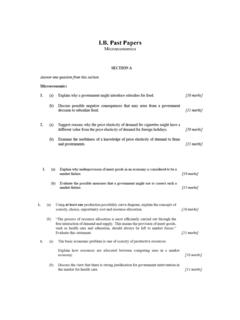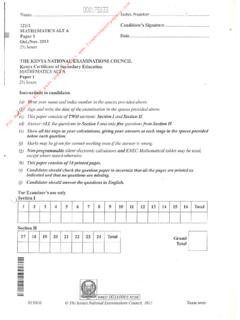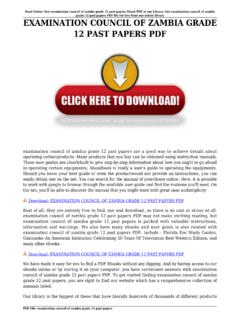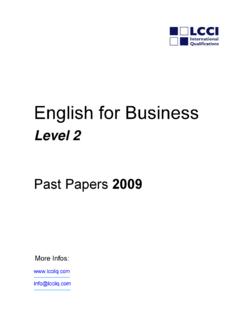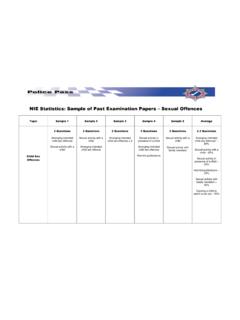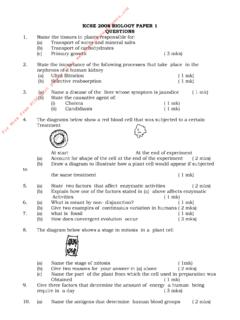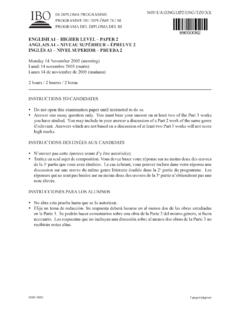Transcription of Using Past Papers - Home - University of Kent
1 Using past PapersVALUE Learning Advisory ServiceLong -term Revision Planning Revise systematically: little and often Start by getting a measure of the job When, where, how long0? Exam timetable This will appear on your SDS Click on the Exams button You will find: [ example only; in red!] Module SP310 Location Gillingham (Medway) Day Friday Date Start time Finish time Examinations Time-table, 2016 Monday 9th May to Friday 17thJune Weeks 25 to 30 Including Saturdays; excluding Sundays and Bank Holidays Examinations Time-table, 2016 Stage 1: Generally, Monday 23rd> There may be some exceptions some core Law modules Stage 2 & 3: Monday 9thMay > Note instructions from Examinations Office: it is your responsibility to check your SDS entry regularly for updatesLong -term Revision Planning Check out past Papers Key topics to be revised Rubrics (instructions): how long; how many questions; how are marks allocated etc.
2 Check out Kent exam regulations What will you be allowed to take in? Other rules of the game Exam RegulationsPast Exam Papers May be on Moodlefor your modules Templeman library website: Click on past Exam Papers : past Exam PapersType in Module codePast Exam PapersPast Exam PapersDownload the pdfPast Exam PapersPast Exam PapersCO321/08 University OF KENTFACULTY OF SCIENCE, TECHNOLOGY AND MEDICAL STUDIESLEVEL C EXAMINATIONCOMPUTING LABORATORYI ntroduction to Information SystemsSaturday, 17 May 2008 : paper contains THREE questions, ONE in Section A and TWO in Section TWO questions, question 1 and ONE question from Section are not each question in a separate Exam PapersUNIVERSITY OF KENTLW304/08 FACULTY OF SOCIAL SCIENCESLEVEL C EXAMINATIONLAWOBLIGATIONS IFriday, 23 May 2008 : are TEN questions. There are TWO sections A and B. Candidates shouldanswer FOUR questions, including at least TWO questions from section A.
3 Theremaining questions may be taken from either section A or from section B. Candidatesmust NOTanswer both of questions 6 and answers will be weighted equally in used in one answer should not be substantially duplicated in answer to are supplied with a list of names of cases contained in the lecture handouts. Candidates may refer to a copy of Blackstone's Statutes on Contract, Tort andRestitution, or to copies of the text of any legislation contained therein. Such materialmay be underlined or shaded with a translucent marker but must not be otherwiseannotated. Copies of annotated editions of the legislation are not permitted. The explanatory notes attached to the official version of legislation are not past Papers -General Principles Draw up a list of likely topics not questions Check how frequently that topic appears in exams Use that information to target your revision Focus on the topic, not the question Towards the end of the revision phase0 Start to practice writing answers informally just writing outline sketch answers formally under timed exam conditions Beware of unnecessary panic!
4 OMG, I can t do any of the v. anticipation Never use past Papers for crystal-ball predictions , They set that topic on the last paper , it won t come up this time. Instead, look for repeated topics/themes What are the areas that occur regularlyon past Papers , albeit with different instructions/emphasisNew module no past Papers ? Sometimes this happens! Not a calamity All changes to modules + introduction of new modules are subject to rigorous scrutiny and a QA process You will have Reading lists Lecture lists & notes from lectures Seminar lists & notes from seminarsNew module no past Papers ? The module specification Pay particular attention to this Especially the specific learning outcomesNew module no past Papers ? The module catalogue This will follow the module specification Look for learning outcomes Use all of the above to draw up lists of possible topicsNoting topics Look closely at past Papers over the last 3 or 4 years: current version of module But not exclusively!
5 Try not to list too many sub-topics Concentrate on the main areas Look at frequency Simple 5-bar tally? Once you have a list of topics, map this against any detailed module outline provided by your schoolNoting topics Map against all the other areas of information outlined above Don t spend too long on this audit ! Quick check say 30 mins. per module Add to/adjust/refine topics But by contextualising your exam paper topics you will have a definitive list for revisionFormat/changes As well as looking for topics on past Papers , remember to check the format Read the rubric for each paper and work out the structure of the exam There are times when the format of an exam changes Generally, this will be announced by your schoolFormat/changes If there is a change, the Module Convenor should make sure that students are aware However, it is advisable to check with your seminar leader to see if there are any changes!
6 It s important to confirm that the exam is what you expect Avoid unpleasant surprises on the dayDealing with anxiety/ selecting topics Now you have a list of topics, and are familiar with the examination process, you can use past Papers to begin revising Understandably, many people are anxious about exams Using past Papers successfully should enable you to manage any anxiety Combined with a successful revision process, you will be in more control of the examDealing with anxiety/ selecting topics You will have your weak modules and your strong ones Similarly, you will have topics you are uncertain about and those you are comfortable with The question then arises, Where do I start? Think about the kind of person you are, and what has worked well in the past0 Dealing with anxiety/ selecting topics Model 1 Start with the areas you are more sure of Builds confidence Establishes a can do mentality For you, reduces anxiety Then move on to the harder areas [Don t procrastinate by staying with the comfortable areas too long!]
7 ]Dealing with anxiety/ selecting topics Model 2 Start with the subjects you are lesssure of Focus on the bad areas Work intensively to eliminate/reduce difficult areas You will feel you have begun to face up to the hard areas of revision and the exams For you, reduces anxiety0 Dealing with anxiety/ selecting topics General advice to reduce anxiety0 Start with small chunks of practice/information Work to a time-table Give yourself frequent shortbreaks Include brief reviews constantly Build up to higher levels of concentration/activity Build up to full practice answers (see below) Don t be too ambitious at first!Practice questions general principles No matter how comprehensive and accurate your list of topics is, the exam is more than throwing knowledge at the paper ! It is about how you applyand evaluateyour knowledge You need to understand the waysin which the exam assesses the module: what + howPractice questions general principles 1.
8 In reviewing past Papers , check how topics are often assessed: context and instructions 2. Revision/working with past Papers will never be truly effective unless it ends in some kind of rehearsal of the exam experience Build up to practice questionsPractice questions Start with an open book approach Establish an orderly writing area, but surround your self with books and notes Be generous with the time! But One day spent on what would be a 20 minute response in the exam is ineffective Forty minutes to make sure you really get it is sensibly elastic!Practice questions Gradually increase the rigour of your practice Step 1: closed book, no material but flexible on time Step 2: closed book, stick to the real exam time as much as possible Step 3: as real as possible a rehearsal of the actual exam even if you run out of time! [See Exam techniques for advice on this!]Final thoughts Be systematic Review past Papers for all modules Define specific topics Set sensible time-controlled targets Start gradually Combine the what with the how !
9 Practice actual questions Work with others? Sharing the burden, + spreading the skills and knowledge?Good luck>.. For all your studies, and for the 2016 Examinations! Any questions: Shaun Theobald Further support.











